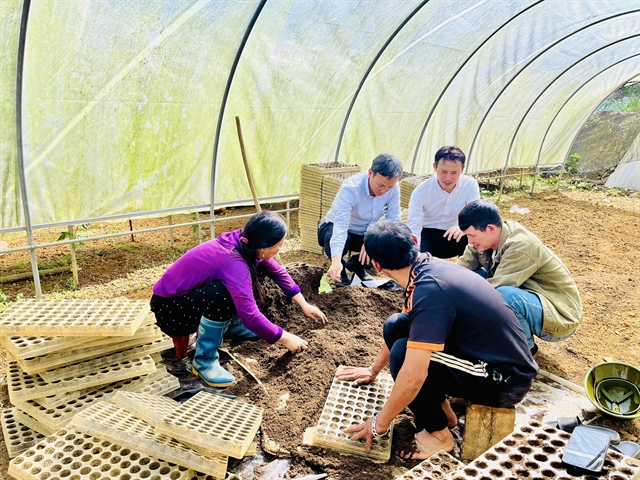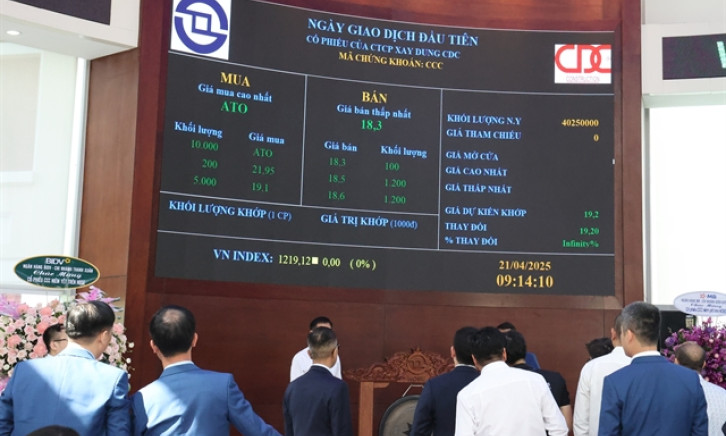Mountain farmers reap benefits from safe agriculture project in Sơn La
In the past, farmers lacked knowledge of safe vegetable-growing practices. Under the project, they now receive training on proper fertilisation and plant care, ensuring the produce meets food safety standards.
Every morning at 6am, Hờ A Chống, a Mông farmer, begins his day tending to the squash garden at the Nông Xanh Cooperative in Vân Sơn Ward, Mộc Châu Town in the northern mountainous province of Sơn La.
For the past two years, Chống has been responsible for weeding and caring for the squash crops.
The job provides him with a steady monthly income of around VNĐ5 million (US$192), a significant improvement from the previous uncertainty he faced as a small-scale farmer, where income only came sporadically when vegetables could be sold.
“Now we don't have to worry about selling the produce ourselves,” said Chống.
“We just follow the proper techniques for planting and taking care of the crops. The cooperative handles everything else.”
According to Chống, many manual tasks such as tilling and making beds for crops are now mechanised, allowing farmers to focus solely on cultivation to ensure safe crops.
In the past, farmers lacked knowledge of safe vegetable-growing practices. Working with the cooperative, they now receive training on proper fertilisation and plant care, ensuring the produce meets food safety standards.
The fields in the cooperative are equipped with mulching film, a plastic sheeting technique that suppresses weeds, retains soil moisture, reduces the need for irrigation and fertiliser, and protects young plants from pests and rodents.
The silver side of the film faces upwards to reflect sunlight and deter insects, while the black side faces downwards to block out light and prevent weed growth.
Đinh Thị Thập, another cooperative member, said: “We used to grow vegetables traditionally, without much knowledge. Fertiliser was often applied incorrectly and the absence of mulching film led to pest infestations and degraded soil.”
The situation changed after the local farmers received training from the cooperative and Japanese experts, who introduced modern farming methods, including the selection of quality seedlings and the application of mulching techniques.
“As a result, crop yields have increased by 20-25 per cent, with produce now meeting the high standards required by supermarkets and vegetarian restaurants,” she added.
Chống and Thập are among 30 permanent farmers currently employed by the cooperative.

JICA support
Nông Xanh Cooperative is one of five cooperatives in the province, receiving both financial and technical support for strengthening safe crop value chains in northern Việt Nam.
The four-year project has been implemented by the Japan International Cooperation Agency (JICA) in collaboration with the National Agricultural Extension Centre since May 2022.
The cooperative receives VNĐ150 million ($5,700) each from the JICA under the project.
According to the director of the cooperative, Lưu Tùng Định, they manage a total of around 50 ha of cultivation area, consisting of 20 ha farmed directly by the cooperative, while the remaining 30 ha belong to affiliated local farmers.
Through the project, cooperative members have received comprehensive training in Vietnamese Good Agricultural Practices (VietGAP) and basic Good Agricultural Practices (GAP), as well as in marketing, market research and sales techniques.
The cooperative also supports the output of vegetables, regardless of the market at the time.
“We sign contracts with local farmers to stabilise the price of vegetables purchased from them,” Định said, adding “Whether the market price is high or low, we still commit to buying from the people at the signed price following the contract so that people can feel secure in production without worrying about output or losses.”
In addition, the cooperative also proactively signs contracts and finds output for products to ensure income for farmers.
“We now provide regular employment to over 30 people, sometimes up to 60 during peak seasons,” Định said.
Revenue from the project has grown significantly since joining the project, from over VNĐ3 billion ($115,700) in 2022 to nearly VNĐ6 billion ($231,400) in 2023 and over VNĐ14 billion ($540,000) in 2024.
Clean vegetables from the cooperative are now supplied to supermarkets, organic food stores, processing companies and restaurants in the cities of Hà Nội, Hải Phòng, Quảng Ninh, Nghệ An and Hà Tĩnh.
The cooperative currently supplies around 1,000 tonnes of vegetables per year.
Looking ahead, Định said the cooperative planned to develop its own packaging, branding and logo, while expanding its distribution network to over 100 ha.
“We aim to build a sustainable value chain from production management to sales, including the construction of two preliminary processing warehouses in Mộc Châu Township and Vân Hồ District.”

Changed mindset
Kayano Naoki, a JICA expert and project coordinator, said the natural advantages of the province are that the climate here is favourable and water sources are relatively unpolluted. They are ideal conditions for growing off-season vegetables.
During certain times of the year, when vegetables are scarce in the lowlands, Sơn La can fill that gap. That offers a competitive edge for these farmers.
Kayano also praised the adaptability of local cooperatives and farmers in the province, who have actively embraced scientific methods and technical training.
He noted that multiple training sessions and study visits helped farmers improve both yield and quality.
"Local mindsets have shifted," he said.
“Instead of the old ‘planting now, selling later’ approach, they now plant to sell."
So far, the cooperatives participating in the project are very proficient in surveying the market before building a production plan, thereby choosing the output market that best suits their capacity.
If they are still modest, they choose the wholesale market in the province. If they are more stable, they aim to supply supermarkets, restaurants, hotels and can even aim for export, he said.
The Director of the provincial Agricultural Extension Centre, Công Xuân Ngọc, agreed that the project's most significant impact was changing farmers’ mindsets, moving from fragmented, spontaneous farming to planned and market-driven production.
The mindset of 'planting to sell' instead of 'planting now, selling later' is gradually ingrained in people's awareness.
Additionally, the main goal of the project is supporting local people to grow safe crops, which also fits with the province's targets.
Thanks to the guidance of JICA experts, the cooperatives that participated in the project have not only improved production techniques, but also strengthened market connections, leading to more stable incomes.
Even last year, when Typhoon Yagi caused widespread damage, the cooperatives swiftly resumed production to maintain supply chains.
Phạm Thị Lan, of Sơn La’s Crop Production and Plant Protection Division, said the province planned to continue applying JICA’s training materials and integrate them into ongoing extension programmes to expand safe vegetable and fruit production areas in the future.






